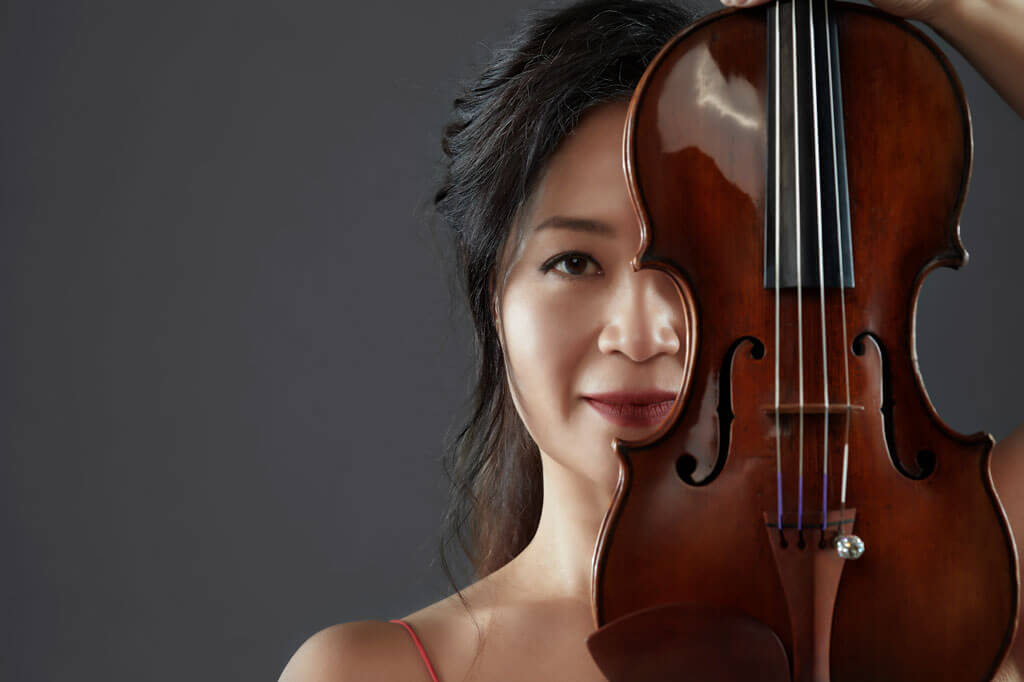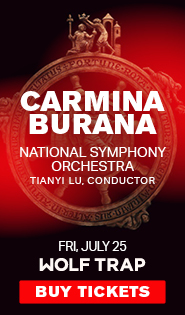Chee-Yun proves a violinist for all seasons with Fairfax Symphony Orchestra

Violinist Chee-Yun performed the “Four Seasons” of Vivaldi and Piazzolla with the Fairfax Symphony Orchestra Saturday night.
Antonio Vivaldi’s Op. 8, known to all as The Four Seasons, contain astonishingly inventive, vivid music whose impact has dulled with incessant exposure. How can you make it sound fresh?
On Saturday night, violinist Chee-Yun, the Fairfax Symphony Orchestra, and music director Christopher Zimmerman did just that, by following a trail first blazed by Gidon Kremer. The idiosyncratic violinist, enamored of the music of Astor Piazzolla, asked Russian composer Leonid Desyatnikov to transcribe the Argentine composer’s Four Seasons of Buenos Aires from its original instrumentation of violin, electric guitar, piano, bass, and bandoneon so that it could be played alongside the Vivaldi by string orchestra and soloist, as a 20th-century contrast.
Kremer recorded the effort on Nonesuch in 2000, under the title Eight Seasons, and Desyatnikov’s transcription has since been performed widely. However, playing both Vivaldi and Piazzolla in one evening tests any soloist’s fortitude—over an hour of demanding music, switching back and forth from Baroque concerto to Argentine tango.
The violinist played the two sets of Seasons in a nonlinear but effective order, starting with Vivaldi’s “Spring” and ending with that of Piazzolla. The former did not get things off to a promising start on Saturday. The FSO’s strings sounded sluggish and overly plush, while Chee-Yun had trouble getting in sync with the principal string players during the bird calls of the first movement.
It was a pleasant surprise, then, to hear soloist and orchestra fluently swaggering in tango rhythm in Piazzolla’s “Summer” immediately after. Chee-Yun’s playing sounded more fluid and jovial, and the orchestra threw itself into glissandi, pizzicato, and other extended techniques to evoke the original instrumentation. They made a nice jest out of Desyatnikov’s addition of a quote from Vivaldi’s “Winter” concerto, reminding us of the differing climates in Italy and Argentina.
In Vivaldi’s “Summer,” Chee-Yun took more chances with ornaments and tweaks to phrasing, and the orchestra matched her lively playing, even if the violins still didn’t have the unanimity one might hope for. Piazzolla’s “Autumn” featured a poised, rapturous cello solo from FSO principal Natalia Vilchis, while Chee-Yun delivered a tango with fine shades of color as the orchestra and Zimmerman provided supple support.
After intermission, Chee-Yun came out blazing in the first movement of Vivaldi’s “Autumn,” with blistering playing in one solo and a daringly long rest in which time seemed to stop before a rapturous slow melody in another. She played along sweetly with the orchestra during the cozy second movement, where keyboardist Sophia Kim Cook provided tidy support on (disappointingly) an electronic keyboard imitating a harpsichord. (At least the keyboard could be amplified to be heard above the orchestra.) An invigorating finale made this the standout of the evening.
After a languorous, melancholy “Winter” from Piazzolla, beautifully rendered by Chee-Yun and the orchestra, Vivaldi’s “Winter” was more bracing. While the violins of the FSO sounded a bit tired at this point, Chee-Yun continued to show amazing stamina, dazzling in solos depicting the chill of the winter wind and caressing the Largo slow movement’s warm melody.
Piazzolla’s “Spring” began with an angular, aggressive melody that bounced invigoratingly between Chee-Yun and the orchestra, as though shaking off winter with a gust of wind, and continued with coiled energy until the end, when the harpsichord intoned a ghostly echo of Vivaldi’s “Autumn,” another reminder of the centuries and hemisphere separating Vivaldi and Piazzolla. It made a fitting close to a memorable display of concentration, virtuosity, and stylistic fluency from Chee-Yun and the FSO.
Before Chee-Yun’s efforts, FSO assistant conductor John Murton led the orchestra in a performance of Giacomo Puccini’s Chrysanthemums, a short, maudlin piece elevated on Saturday by magnetically warm, even playing from the FSO’s cellos and basses, who distinguished themselves all night.
The Fairfax Symphony Orchestra presents the world premiere of Malek Jandali’s Clarinet Concerto with soloist Anthony McGill, plus Beethoven’s “Eroica” Symphony, on March 9. www.fairfaxsymphony.org


